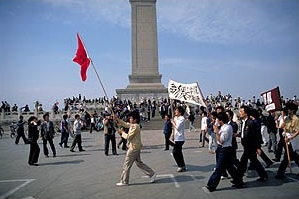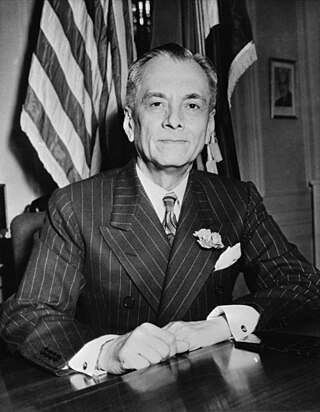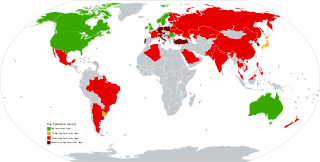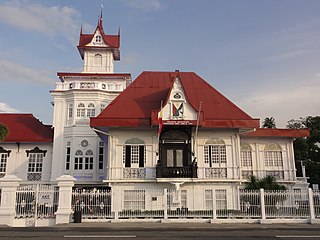
1989 (MCMLXXXIX) was a common year starting on Sunday of the Gregorian calendar, the 1989th year of the Common Era (CE) and Anno Domini (AD) designations, the 989th year of the 2nd millennium, the 89th year of the 20th century, and the 10th and last year of the 1980s decade.

The Tiananmen Square protests, known within China as the June Fourth Incident, were student-led demonstrations held in Tiananmen Square in Beijing, China, lasting from 15 April to 4 June 1989. After weeks of unsuccessful attempts between the demonstrators and the Chinese government to find a peaceful resolution, the Chinese government deployed troops to occupy the square on the night of 3 June in what is referred to as the Tiananmen Square massacre. The events are sometimes called the '89 Democracy Movement, the Tiananmen Square Incident, or the Tiananmen uprising.

Title IX is a landmark federal civil rights law in the United States that was enacted as part of the Education Amendments of 1972. It prohibits sex-based discrimination in any school or any other education program that receives funding from the federal government. This is Public Law No. 92‑318, 86 Stat. 235, codified at 20 U.S.C. §§ 1681–1688.

Manuel Luis Quezon y Molina, also known by his initials MLQ, was a Filipino lawyer, statesman, soldier, and politician who was president of the Commonwealth of the Philippines from 1935 until his death in 1944. He was the first Filipino to head a government of the entire Philippines and is considered the second president of the Philippines after Emilio Aguinaldo (1899–1901), whom Quezon defeated in the 1935 presidential election. He is often regarded as the greatest President of the Philippines, and the quintessential Filipino statesman. Quezon City, a city in Metro Manila, is named after him.

Prior to the Chinese Student Protection Act of 1992 (CSPA), President George H.W Bush issued Executive Order 12711 in 1990. This policy implementation was solidified by the actual Act in 1992. The Act's main sponsors were Nancy Pelosi (D-CA) for the House of Representatives and Senator Slade Gorton (R-WA) for the Senate. The Chinese Student Protection Act of 1992 was passed on May 21, 1992, by the Senate, and passed by the House of Representatives on August 10, 1992. President George H. W. Bush signed it into law on October 9, 1992. The Chinese Student Protection Act became Public Law 102-404, 106 Stat. 1969.

Public holidays in the Philippines are of two types: regular holidays and special non-working days.

Flag desecration is the desecration of a flag, violation of flag protocol, or various acts that intentionally destroy, damage, or mutilate a flag in public. In the case of a national flag, such action is often intended to make a political point against a country or its policies. Some countries have laws against methods of destruction or forbidding particular uses ; such laws may distinguish between the desecration of the country's own national flag and the desecration of flags of other countries. Some countries have also banned the desecration of all types of flags from inside the country to other country flags.

The United States Office of Personnel Management (OPM) is an independent agency of the United States government that manages the United States federal civil service. The agency provides federal human resources policy, oversight, and support, and tends to healthcare (FEHB), life insurance (FEGLI), and retirement benefits for federal government employees, retirees, and their dependents.

The handover of Hong Kong from the United Kingdom to the People's Republic of China was at midnight on 1 July 1997. This event ended 156 years of British rule in the former colony, which began in 1841.

Lesbian, gay, bisexual, transgender, and queer (LGBTQ) people in the United States may face legal challenges not experienced by non-LGBTQ residents, with civil protections widely varying by state. The rights of lesbian, gay, bisexual, transgender, and queer (LGBTQ) people in the United States were among the most advanced in the world until the beginning of the second Trump presidency, with public opinion and jurisprudence changing significantly since the late 1980s.

The Department of Foreign Affairs is the executive department of the Philippine government tasked to contribute to the enhancement of national security, protection of the territorial integrity and national sovereignty, to participate in the national endeavor of sustaining development and enhancing the Philippines' competitive edge, to protect the rights and promote the welfare of Filipinos overseas and to mobilize them as partners in national development, to project a positive image of the Philippines, and to increase international understanding of Philippine culture for mutually-beneficial relations with other countries.

Visitors to the United States must obtain a visa from one of the U.S. diplomatic missions unless they are citizens of one of the visa-exempt or Visa Waiver Program countries.

Independence Day is a national holiday in the Philippines observed annually on June 12, commemorating the declaration of Philippine independence from Spain in 1898. Since 1978, it has been the country's National Day.

In the United States, affirmative action consists of government-mandated, government-approved, and voluntary private programs granting special consideration to groups considered or classified as historically excluded, specifically racial minorities and women. These programs tend to focus on access to education and employment in order to redress the disadvantages associated with past and present discrimination. Another goal of affirmative action policies is to ensure that public institutions, such as universities, hospitals, and police forces, are more representative of the populations they serve.

Hong Kong–United States relations are bilateral relations between Hong Kong and the United States.
The 1989 Tiananmen Square protests and massacre were the first of their type shown in detail on Western television. The Chinese government's response was denounced, particularly by Western governments and media. Criticism came from both Western and Eastern Europe, North America, Australia and some east Asian and Latin American countries. Notably, many Asian countries remained silent throughout the protests; the government of India responded to the massacre by ordering the state television to pare down the coverage to the barest minimum, so as not to jeopardize a thawing in relations with China, and to offer political empathy for the events. North Korea, Cuba, Czechoslovakia, and East Germany, among others, supported the Chinese government and denounced the protests. Overseas Chinese students demonstrated in many cities in Europe, America, the Middle East, and Asia against the Chinese government.
The following lists events from 1992 in China.
The following are the events in related to Philippine law in 2016. This includes developments in criminal investigations of national notability.

Executive Order 13936, entitled "The President’s Executive Order on Hong Kong Normalization", is an executive order signed by U.S. President Donald Trump on July 14, 2020. On the same day Trump had signed into law Hong Kong Autonomy Act, one of the laws from which the order derives authority. The act and the executive order are the U.S. response to the imposition of a controversial national security law in Hong Kong by the Standing Committee of the National People's Congress of China on June 30, 2020, which was described as "an unusual and extraordinary threat [...] to the national security, foreign policy, and economy of the United States" in the preamble.
The United States government applies economic sanctions against certain institutions and key members of the government of the People's Republic of China and its ruling Chinese Communist Party (CCP), certain companies linked to the People's Liberation Army (PLA), and other affiliates that the U.S. government has accused of aiding in human rights abuses. The U.S. maintained embargoes against China from the inception of the People's Republic of China in 1949 until 1972. An embargo was reimposed by the U.S. following the 1989 Tiananmen Square protests and massacre. From 2020 onward, the U.S. imposed sanctions and visa restrictions against several Chinese government officials and companies, in response to the persecution of Uyghurs in China, human rights abuses in Hong Kong and Tibet, military-civil fusion, support for the Russian invasion of Ukraine, and fentanyl production.














